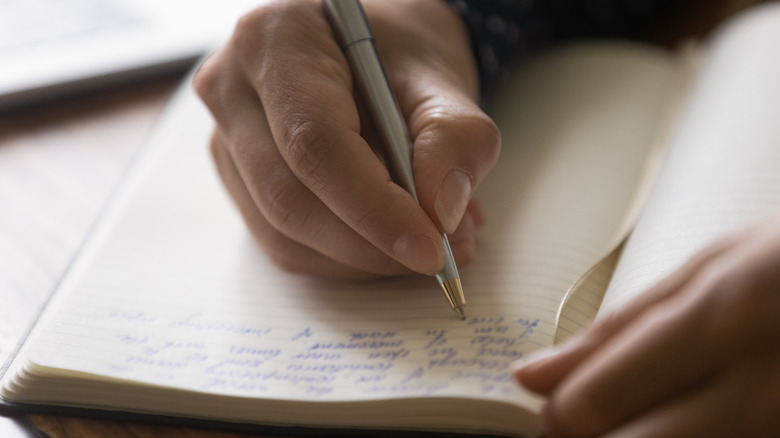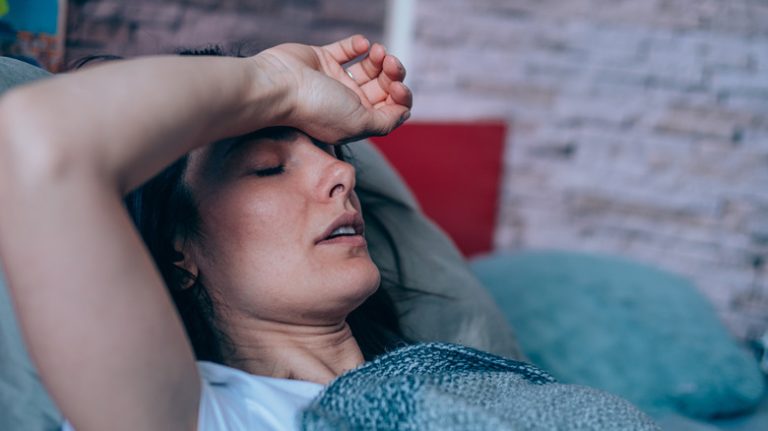Anxiety often thrives on worries about the future or rumination over the past (via Psychology Today). If you’ve ever laid awake at night replaying an embarrassing mistake or fretting over the uncertainty of years to come, you know how a buzzing mind can negatively impact your quality of sleep.
Dr. Michael K. Scullin, an assistant professor at Baylor, reinforces this, telling Shape, “One of the biggest barriers to falling asleep for people is that we have thoughts circling around in our heads when we turn out the lights. These thought processes work in opposition to relaxing and falling asleep.”
While meditation, reading, or turning on a soothing playlist are all strategies purported to help ease us into sleep (via Healthline), science shows us that implementing a journaling practice in the evening can also enable us to fall asleep more quickly as well as increase our overall time spent asleep (via Health Grades).
Better yet, experts say there’s a variety of different ways and times of day that one can journal to reap these benefits. So whether you’re a fan of long-form writing or you’re more of a quick list-maker, there’s a journaling style out there for you.
To-do lists versus long-form writing before bedtime

A 2024 study involving 57 young adults between the ages of 18 and 30 looked at the relationship between sleep onset latency and journaling subject matter. Implementing a five-minute writing exercise before bedtime, participants were asked to either journal about tasks they had successfully completed within the days prior, or to jot down future tasks needing to be completed in the coming days. Those who journaled about their future to-do list fell asleep in less time than those who journaled about recently completed tasks. Furthermore, a positive correlation was found between how specific participants were in outlining their planned tasks and how quickly they fell asleep.
But our journals can be filled with more than just grocery lists in order to boost our quality of sleep. Experts at Psychology Today say that reflecting on things we’re grateful for can also help us sleep soundly by improving our mood. Additionally, journaling about your current emotions — even anger or stress — can help us let go of what we’re feeling, process the emotions, and problem-solve as needed, leading to a better quality of sleep.
How often you should journal to reap the greatest sleep benefits

If the idea of developing a new habit sounds daunting, fear not. According to Sleep.com, assistant professor Dr. Michael Scullin states that journaling doesn’t need to be done consistently in order to reap its sleep benefits. Rather, no matter how regularly we journal, every minute we spend doing so is one less minute we spend glued to our devices. Devices can interrupt our sleep cycle due to the blue light emitted.
Dr. Scullin shares his own experience with bedtime journaling via Sleep.com, stating, “I don’t actually [journal] every single night; I do this on nights I can tell that I need it. There is some calibration involved in that — figuring out when you need it and when you don’t — so my recommendation to people is to try it for a few nights and see if it seems to help and if so, keep that pad of paper by your bed.”
Depending on what form of journaling you choose, you’ll want to time your practice accordingly. Experts at Psychology Today say that list-making and gratitude items can be written down right before climbing into bed, while writing that centers around emotion processing is best done around dinnertime or roughly two to three hours before bed. This allows your mind time to unwind, rather than exacerbating negative emotions right before your head hits the pillow.



